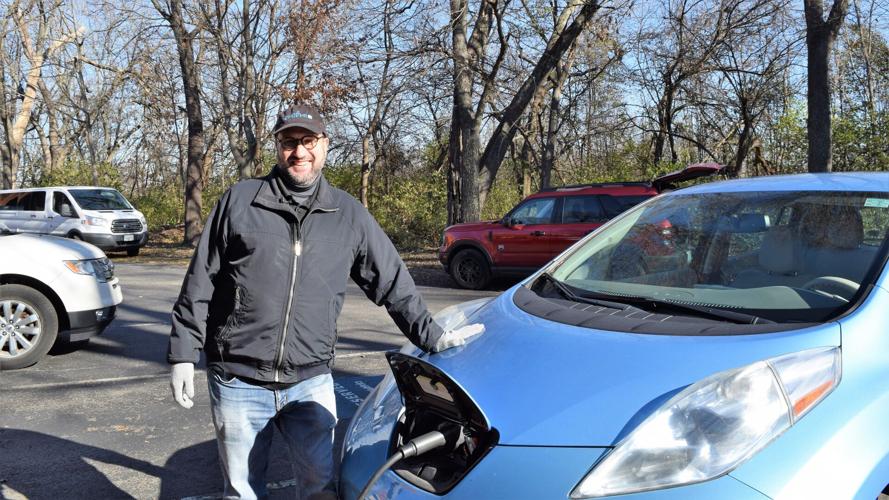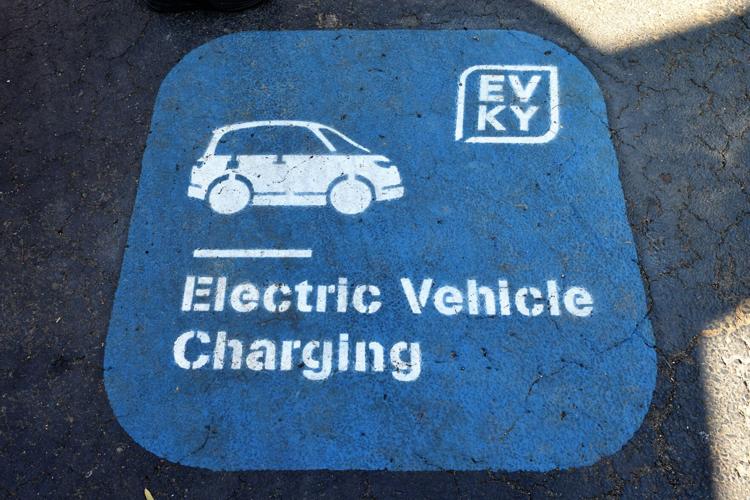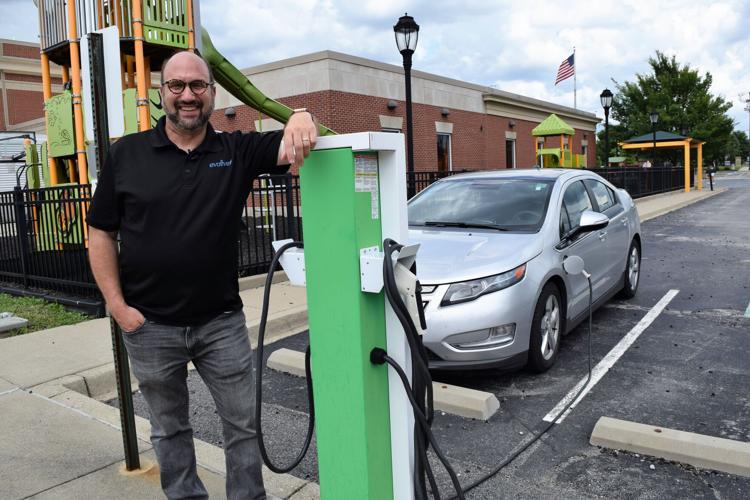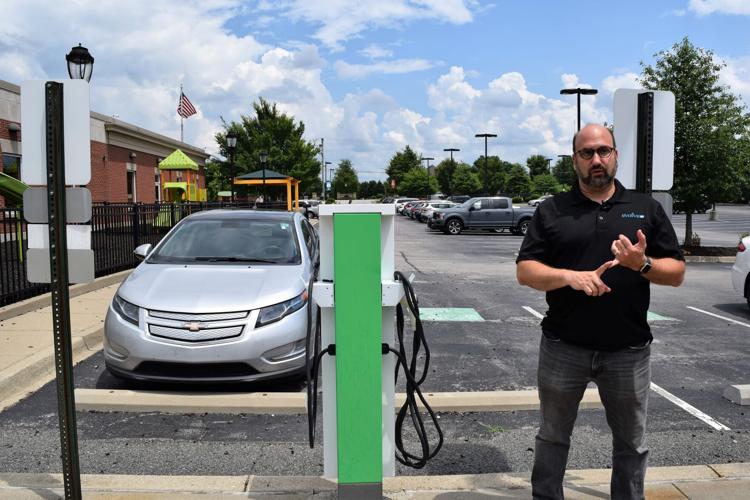LOUISVILLE, Ky. (WDRB) — When it was built about a decade ago, the “Highland Green” building in the Cherokee Triangle had enough eco-friendly features to earn a “gold” certification from a national group that measures energy efficiency and sustainable design.
But the building, which houses Highland Cleaners, was still missing something: a charging station for electric vehicles, or EVs.
Michael Jones, who owns the cleaners and the building, had been trying to procure a charger, but he was told they were on back-order.
That’s when Jones got an unsolicited call from someone who could help. Stuart Ungar, a Louisville freelance gig worker and EV enthusiast, wasn’t an electrician, architect or engineer. He was one of a small group of EV owners who wanted to see more public charging stations in Louisville, so they decided to put them in.
“I said ‘Oh my god, if you could help me get this done, that would be great,’” Jones said.
In 2016, the building at 1401 Bardstown Road became the third EV charging station installed by Evolve KY, the nonprofit group Ungar co-founded with Jonathan Tyson, his then-east Louisville neighbor and fellow Nissan Leaf owner.
The federal government is about spend $5 billion building a national network of EV chargers, part of the Bipartisan Infrastructure Law of 2021.
But Louisville already has a healthy network free, public charging stations thanks in large part to Ungar’s “Adopt a Charger” program at Evolve KY.
Since it began eight years ago, the nonprofit has installed chargers at nearly 60 locations — from YMCAs to churches to shopping centers — in Kentucky and southern Indiana, the vast majority in the Louisville metro area. That’s a significant chunk of the 120 public charging stations within 50 miles of Louisville, according to a U.S. Department of Energy database.
What’s more, like water fountains and wifi, anyone with any electric or plug-in hybrid car can use an Evolve KY charger. Some charging stations — including ones operated by Louisville’s power company, LG&E — require users to pay for the electricity. Others are specific to vehicle makes.
Even the publicly funded, high-capacity chargers that Kentucky is about to install every 50 miles along interstates and major highways may not be free to use. Details such as whether drivers will pay a fee and who pays for the electricity are still to be worked out, said Kentucky Transportation Secretary Jim Gray.
Adding to the uncertainty is a new sales tax on electric-vehicle charger electricity that Kentucky’s Republican-controlled legislature adopted earlier this year. The tax goes into effect in 2024.
‘Something that everybody can do’
Ungar, who described his group as helping to “spread the Gospel” of EVs, said the goal is to make it easier for people to adopt fully electric cars by providing abundant charging options.
“Eight years ago, the infrastructure was virtually non-existent,” Ungar said. “You would find some chargers, but they would be at car dealerships … They’re not located around a park. They’re not located around coffee shops or restaurants or museums — places where you want to spend some time. So, we wanted to put out infrastructure as a way of showing that EVs are something that everybody can do.”
A free charger near someone’s work, home or errands can make EV ownership possible, especially because many people lack garages, off-street parking and charging capacity at their homes, Ungar said.
Electric vehicles remain a small — but fast growing — segment of the auto market. About 5.6% of U.S. new car sales in 2022 have been EVs, with hybrid gas-electric cars and plug-in hybrids accounting for another 6.6%, according to Cox Automotive.
Legacy automakers such as Ford and General Motors are diving headlong into the EV space. Ford envisions growing EVs to half of its sales by 2030, while GM plans to phase out gas-powered cars by 2035.
Kentucky, the third largest auto-producing state, has a vested interest in the future of the industry. Gov. Andy Beshear has proclaimed the Bluegrass State the EV battery capital of the country, with Ford and its Korean partner SK Innovation planning a $5 billion factory in Elizabethtown and a separate, $2 billion factory planned for Bowling Green.
While private parties like Evolve KY have been leading the way, the federal government is about to pour money into EV infrastructure.
Combined, Indiana and Kentucky are set to spend nearly $200 million installing EV chargers in the next few years thanks to the federal infrastructure law. The stations will be high-capacity “DC fast” chargers, which can fully charge an EV in about half an hour, and will be every 50 miles along interstates and major highways.
Gray, the Kentucky transportation secretary, said the state plans 30 to 32 fast chargers along major roadways by the end of 2024. Then, the state will start looking to electrify community locations like state parks.
“As time goes forward, you’re going to see a really robust build out,” Gray said.
Major differences in chargers
There are major differences between the chargers that Evolve KY can add to most any business or public place and the superfast chargers the government will place along highways.
Most of the Evolve KY chargers are “Level 2” capacity — the sort that be installed by an electrician and made part of a home or business’ existing electric bill. Level 2 chargers get about 25 miles of electric range per hour, Ungar said, so it takes several hours or even an overnight session to fully charge a car.
But the Level 2 chargers can be installed for about $6,000 to $9,000, Ungar said. The “DC fast” chargers will cost about $1 million each, Gray said.
Ungar said his group pays for the chargers through fundraising, grants and sponsorships. Often, the organization owning the property will pick up the tab. Meanwhile, the electricity that vehicle chargers draw is usually a minimal cost for the charging host.
Last spring, Evolve KY oversaw the installation of chargers at eight Presbyterian churches around Louisville.
Paid for partly by denominational funds and partly by individual churches, the chargers are in keeping with Presbyterian teaching about being good stewards of God’s creation, said Rev. John Odom, general presbyter for the Mid-Kentucky Presbytery, a group of 47 churches that are part of Louisville-based Presbyterian Church USA.
“This is a great way to practice what we preach,” he said.
The churches calculated that they could easily afford the additional $100 to $300 in electricity each year, he said.
Jones, the Highland Cleaners owner, commissioned Ungar’s group to put in a second charging station at Prospect Plaza, a shopping center he owns off U.S. 42 in Prospect.
Neither charging station leads to a meaningful boost in business, Jones said. No one waits very long at the dry cleaners, he said.
“We’re doing it more as a public enhancement,” Jones said. “… It’s literally just pennies of electricity. The cost is nothing.”



















